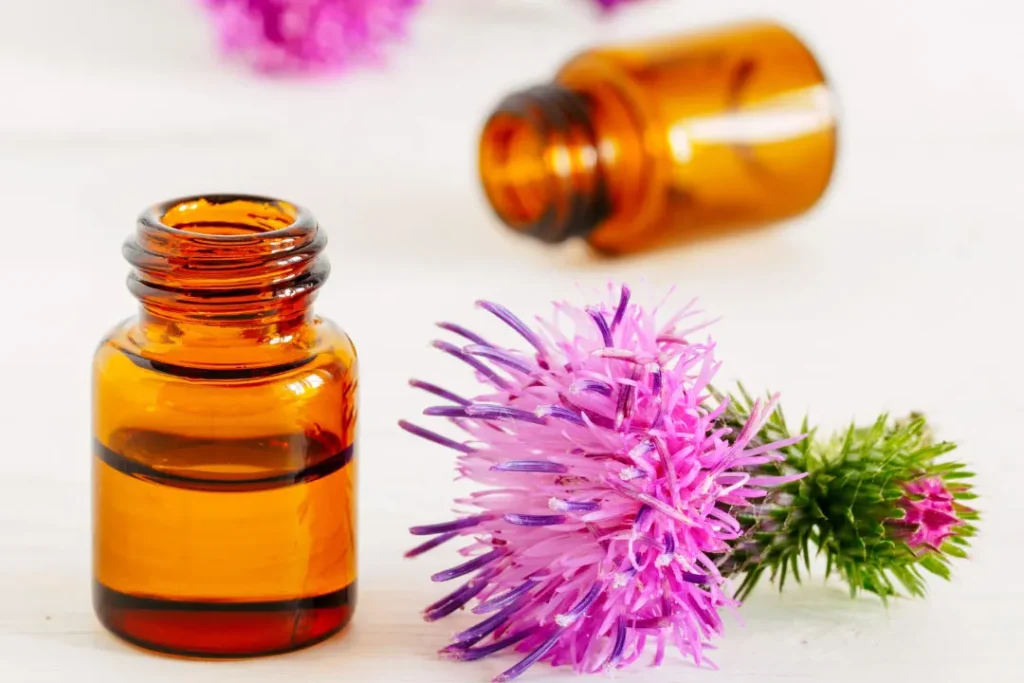Traditional medicinal herbs are now again gaining popularity as people look for natural, holistic solutions to their health problems. Burdock (Arctium lappa), a root vegetable originally from Europe and Asia but now common in North America, is one example of this kind of plant. It has long been a pillar of conventional Asian and European medicine. In this article, we are going to look into Burdock’s nutritional profile, health benefits, ideal dosage, possible adverse effects, and interactions with other components.
You May Also Like:
5 Great Nootropic Herbs for Focus and Mental Clarity
A Nootropic Herb for Cognitive Enhancement: Discover Bacopa Monnieri Benefits and Side Effects
Burdock: Benefits, Dosage, Side Effects, Drug Interactions, and Other Important Information is an original (NootropicsPlanet) article.
Nature of Burdock
The scientific name for Burdock is Arctium lappa. It is a type of biennial plant belonging to the Asteraceae family and has thick, meaty taproots that are said to reach one meter in length. The huge, heart-shaped leaves are characteristic of Burdock which is purple.
Burdock root may be eaten and is often used in Asian cuisine as a vegetable. However, ancient medical systems like ancient Chinese Medicine and Ayurveda have been using the plant’s therapeutic benefits for millennia.
Health Benefits of Burdock
Antioxidant and Anti-inflammatory Properties:
The phenolic chemicals listed above are what give Burdock its strong anti-inflammatory and antioxidant capabilities. Burdock can improve general health and well-being by lowering these damaging processes.
Inulin, a form of dietary fiber that may function as a prebiotic, is abundant in Burdock. Prebiotics are almost essential in maintaining and promoting balanced gut health. With better digestion, you can promote a healthier microbiome.
Burdock may offer anti-cancer qualities, notably against breast and pancreatic tumors, according to many studies. The lignan component arctigenin, which is present in Burdock is renowned for its capacity to cause apoptosis (programmed cell death) in cancer cells. More investigations in humans are required to confirm these effects since these studies have mostly been conducted in vitro or using animal models.

The Chemistry of Burdock
The biennial plant known as Burdock is renowned for its extensive storage of bioactive chemicals in its deep roots. Inulin, a dietary fiber that maintains healthy gut flora, phenolic acids, quercetin, and luteolin, as well as numerous other substances including tannins, sterols, and volatile oils are among these substances. They are all powerful antioxidants. These substances’ anti-inflammatory, antioxidant, anti-cancer, and anti-diabetic characteristics have all been connected to therapeutic outcomes.
Burdock’s antioxidant effect is mostly attributed to phenolic chemicals, especially caffeoylquinic acid derivatives and flavonoids like quercetin and luteolin. These substances work by lowering oxidative stress, a major factor in chronic illnesses, and neutralizing dangerous free radicals.
Physiological Mechanisms of Action of Burdock
The abundance of bioactive chemicals that Burdock possesses is what gives it its medicinal properties. These substances and how they interact with the body are principally responsible for their physiological effects.
The plant’s anti-inflammatory and antioxidant activities are mostly attributable to the presence of phenolic substances, such as flavonoids and derivatives of caffeoylquinic acid. By scavenging free radicals, these substances lessen oxidative stress and stave off inflammation at the cellular level. Burdock may help prevent or lessen many chronic illnesses connected to oxidative stress and inflammation by reducing these conditions.
Burdock’s inulin content is crucial in improving intestinal health. Inulin feeds the good bacteria in the stomach, promoting a balanced microbiome. For good digestion, immunological response, and general health, a healthy gut flora is essential.
Burdock has also been shown to have possible anti-cancer effects. Burdock’s arctigenin molecule has been investigated for its capacity to cause cancer cells to undergo apoptosis. Apoptosis is a normal cellular mechanism causing cancer cells to grow uncontrolled.
It’s crucial to remember that these modes of action are based on early analysis, typically in vitro or animal studies. To completely comprehend the physiological effects of Burdock and prove its therapeutic potential, further human clinical studies are required.

Optimal Dosage of Burdock
The number of beneficial chemicals in Burdock might vary based on cultivation and preparation techniques, making it difficult to determine the ideal dose. Typically, a dose of 2 to 6 grams per day is advised for the root extract. However, it is advised to follow the directions on supplement labels or speak with a healthcare provider given the absence of defined dose requirements.
Burdock may be eaten as a vegetable in soups and stir-fries, a tea, a decoction, a tincture, or in other ways. It’s important to keep in mind that Burdock should not be taken as an alternative to a healthy lifestyle but rather as part of a balanced diet, just like any supplement.
Side Effects of Burdock
When ingested in moderation, Burdock is usually regarded as safe for the majority of individuals. However, because they are members of the same plant family, some people may develop allergic responses, especially those who are sensitive to ragweed, daisies, or chrysanthemums.
Due to its diuretic properties, Burdock might in rare instances lead to electrolyte imbalances. Additionally, it has been claimed to drop blood sugar levels and interact with diabetic drugs, perhaps resulting in hypoglycemia. Therefore, while consuming Burdock, people who are taking diabetic medication should regularly check their blood sugar levels.
Furthermore, anyone using blood thinners or those who will soon have surgery should take care while using Burdock owing to its propensity to affect blood coagulation. Due to a paucity of studies on the safety of Burdock in these groups, pregnant and nursing women are also recommended to avoid it.

Potential Substance Interactions of Burdock
There have been reports of drug interactions involving Burdock. It could cause an extreme decline in blood sugar levels by enhancing the effects of diabetic drugs. Hypoglycemia, a condition marked by dangerously low blood sugar levels, may result from this interaction. Dizziness, bewilderment, shivering, and, in extreme instances, loss of consciousness are all signs of hypoglycemia.
A different possible interaction is with blood thinners like warfarin. The use of Burdock in conjunction with anticoagulant or antiplatelet medications may increase the risk of bleeding and bruising due to reports that it slows blood coagulation.
Even while these connections may be important, they are not all-inclusive. Before beginning any new supplement, including Burdock, it is imperative to speak with a healthcare provider due to the complexity of drug-supplement interactions.
Best Responsible Uses of Burdock
A balanced strategy is necessary for Burdock usage that is appropriate. Although it’s usually regarded as safe for the majority of individuals, it’s crucial to start with tiny dosages to gauge personal tolerance. Furthermore, using Burdock in lieu of qualified medical care is not advised. It may be used as a complement to a comprehensive wellness strategy, but it shouldn’t be the only form of care for severe or persistent illnesses.
A healthcare professional should be consulted by anybody thinking about taking Burdock supplements to be sure it’s safe for them and won’t interfere with any existing prescriptions or pose any other risks to their health. Burdock should be avoided by those who are known to be allergic to plants of the Asteraceae/Compositae family, such as daisies and chrysanthemums.
Additionally, it is suggested that pregnant and nursing women refrain from using Burdock supplements owing to the lack of safety evidence. Due to the possibility of significant bleeding, the same warning is advised for people who are scheduled for surgery.
Burdock may provide certain health advantages, but they must be weighed against any possible negative effects and possible interactions. Understanding these complications and consulting a specialist when in question are key to using it responsibly. As with any supplement, safe, knowledgeable usage is the key to increasing benefits and lowering risk.

Burdock:
Conclusion
Burdock (Arctium lappa) is a biennial plant that has a deep taproot and distinctive burrs with traditional use in medicine. The herbal uses of Burdock highlighted its potential in supporting gut wellness as well as its anti-inflammatory and antioxidant usage. The plant also has anti-cancer properties with its notable effectivity against breast and pancreatic tumors. It is believed that the lignan component known as apigenin found in Burdock contributed to the apoptosis of cancer cells in the body.
This biennial plant has extensive storage of bioactive components and prebiotic fibers which is well suited to be used as a health supplement. However, before applying this supplement to your routine, you must remember to consult your doctor regarding your condition. The dosage of this supplement varies based on the person and in order to tackle the wellness strategy, comprehensive research and study on Burdock are required.
References:
- A Review of The Pharmacological Effects of Arctium lappa (Burdock). Retrieved from: https://pubmed.ncbi.nlm.nih.gov/20981575/
- Aqueous Extract of Arctium Lappa L. Root (Burdock) Enhances Chondrogenesis in Human Bone Marrow-Derived Mesenchymal Stem Cells. Retrieved from:https://www.ncbi.nlm.nih.gov/pmc/articles/PMC7686739/
- Effects Of Arctium Lappa L. (Burdock) Root Tea on Inflammatory Status and Oxidative Stress in Patients with Knee Osteoarthritis. Retrieved from:https://pubmed.ncbi.nlm.nih.gov/25350500/
Important Note: The information contained in this article is for general informational purposes only, and should not be construed as health or medical advice, nor is it intended to diagnose, prevent, treat, or cure any disease or health condition. Before embarking on any diet, fitness regimen, or program of nutritional supplementation, it is advisable to consult your healthcare professional in order to determine its safety and probable efficacy in terms of your individual state of health.
Regarding Nutritional Supplements Or Other Non-Prescription Health Products: If any nutritional supplements or other non-prescription health products are mentioned in the foregoing article, any claims or statements made about them have not been evaluated by the U.S. Food and Drug Administration, and such nutritional supplements or other health products are not intended to diagnose, treat, cure, or prevent any disease.


